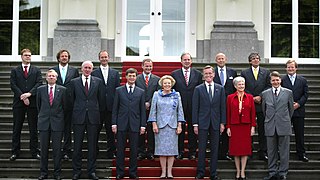
The People's Party for Freedom and Democracy is a conservative-liberal political party in the Netherlands. The VVD, whose forerunner was the Freedom Party, is a party of the centre-right that tries to promote private enterprise and economic liberalism.
The Labour Party is a social democratic political party in the Netherlands.
The Pim Fortuyn List was a right-wing populist political party in the Netherlands named after its eponymous founder Pim Fortuyn, a former university professor and political columnist. The party was considered nationalist as well as adhering to its own distinct ideology of Fortuynism according to some commentators.

The Netherlands is a parliamentary representative democracy. A constitutional monarchy, the country is organised as a decentralised unitary state. The Netherlands can be described as a consociational state. Dutch politics and governance are characterised by a common striving for broad consensus on important issues, within both of the political community and society as a whole.

The first Balkenende cabinet was the executive branch of the Netherlands government from 22 July 2002 until 27 May 2003. The cabinet was formed by the Christian-democratic Christian Democratic Appeal (CDA), the nationalistic Pim Fortuyn List (LPF) and the conservative-liberal People's Party for Freedom and Democracy (VVD) after the election of 2002. The cabinet was a right-wing coalition and had a substantial majority in the House of Representatives with Christian Democratic Leader Jan Peter Balkenende serving as Prime Minister. Prominent economist Eduard Bomhoff served as Deputy Prime Minister and Minister of Health, Welfare and Sport, while prominent Liberal politician Johan Remkes served as Deputy Prime Minister and Minister of the Interior and Kingdom Relations.

The Christian Democratic Appeal is a Christian democratic and conservative political party in the Netherlands.

Joseph Marie Antoine Hubert Luns was a Dutch politician of the defunct Catholic People's Party (KVP), now merged into the Christian Democratic Appeal (CDA), diplomat, and jurist. He served as Secretary General of NATO from 1 October 1971 until 25 June 1984.

The House of Representatives is the lower house of the bicameral parliament of the Netherlands, the States General, the other one being the Senate. It has 150 seats, which are filled through elections using party-list proportional representation. The house is located in the Binnenhof in The Hague; it has temporarily moved to the former building of the Ministry of Foreign Affairs at Bezuidenhoutseweg 67 in The Hague while the Binnenhof is being renovated.

The second Balkenende cabinet was the executive branch of the Government of the Netherlands from 27 May 2003 until 7 July 2006. The cabinet was formed by the Christian-democratic Christian Democratic Appeal (CDA), the conservative-liberal People's Party for Freedom and Democracy (VVD), and the social-liberal Democrats 66 (D66) after the election of 2003. The cabinet was a centre-right coalition and had a slim majority in the House of Representatives with Christian Democratic Leader Jan Peter Balkenende serving as Prime Minister. Liberal Leader Gerrit Zalm, a former Minister of Finance, served as Deputy Prime Minister and returned as Minister of Finance, while former Progressive-Liberal Leader Thom de Graaf served as Deputy Prime Minister and Minister without Portfolio for the Interior.
European integration is the process of industrial, economic, political, legal, social, and cultural integration of states wholly or partially in Europe, or nearby. European integration has primarily but not exclusively come about through the European Union and its policies.
Liberalism in the Netherlands started as an anti-monarchical effort spearheaded by the Dutch statesman Thorbecke, who almost single-handedly wrote the 1848 Constitution of the Netherlands that turned the country into a constitutional monarchy.

Maria Cornelia Frederika "Rita" Verdonk is a Dutch politician and businesswoman formerly affiliated with the People's Party for Freedom and Democracy (VVD) and later Proud of the Netherlands (TON), which she founded in 2007. Since 2022, she has been a municipal councillor of The Hague, elected on the list led by Richard de Mos.
Social integration is the process during which newcomers or minorities are incorporated into the social structure of the host society.

The Ministry of Housing and Spatial Planning is a Dutch government ministry. It was re-established in 2024 after having been disbanded in 2010. The current minister is Mona Keijzer.
APX Group (APX) is an energy exchange operating the spot markets for electricity in the Netherlands, the United Kingdom, and Belgium. Established in 1999, APX provides exchange trading, central clearing and settlement, and data distribution services as well as benchmark data and industry indices. APX has over 180 members from more than 15 countries. In 2014, a total volume of 92 TWh of energy was traded or cleared by APX.

The first Rutte cabinet, also called the Rutte–Verhagen cabinet was the executive branch of the government of the Netherlands from 14 October 2010 until 5 November 2012. The cabinet was formed by the conservative-liberal People's Party for Freedom and Democracy (VVD) and the Christian-democratic Christian Democratic Appeal (CDA) after the election of 2010. The cabinet was a right-wing coalition and had a minority in the House of Representatives but had confidence and supply from the Party for Freedom (PVV) for a slim majority with Liberal Leader Mark Rutte serving as Prime Minister. Christian Democratic Leader Maxime Verhagen served as Deputy Prime Minister and Minister of Economic Affairs, Agriculture and Innovation.

The Reformed Political League was an orthodox Protestant political party in the Netherlands. The GPV is one of the predecessors of the Christian Union. The party was a testimonial party.

Chandrikapersad "Chan" Santokhi is a Surinamese politician and former police officer who is the 9th president of Suriname, since 2020. After winning the 2020 elections, Santokhi was the sole nominee for president of Suriname. On 13 July, Santokhi was elected president by acclamation in an uncontested election. He was inaugurated on 16 July.

Denk, legally registered as Politieke Beweging Denk, is a political party in the Netherlands, founded on a minority rights platform.













